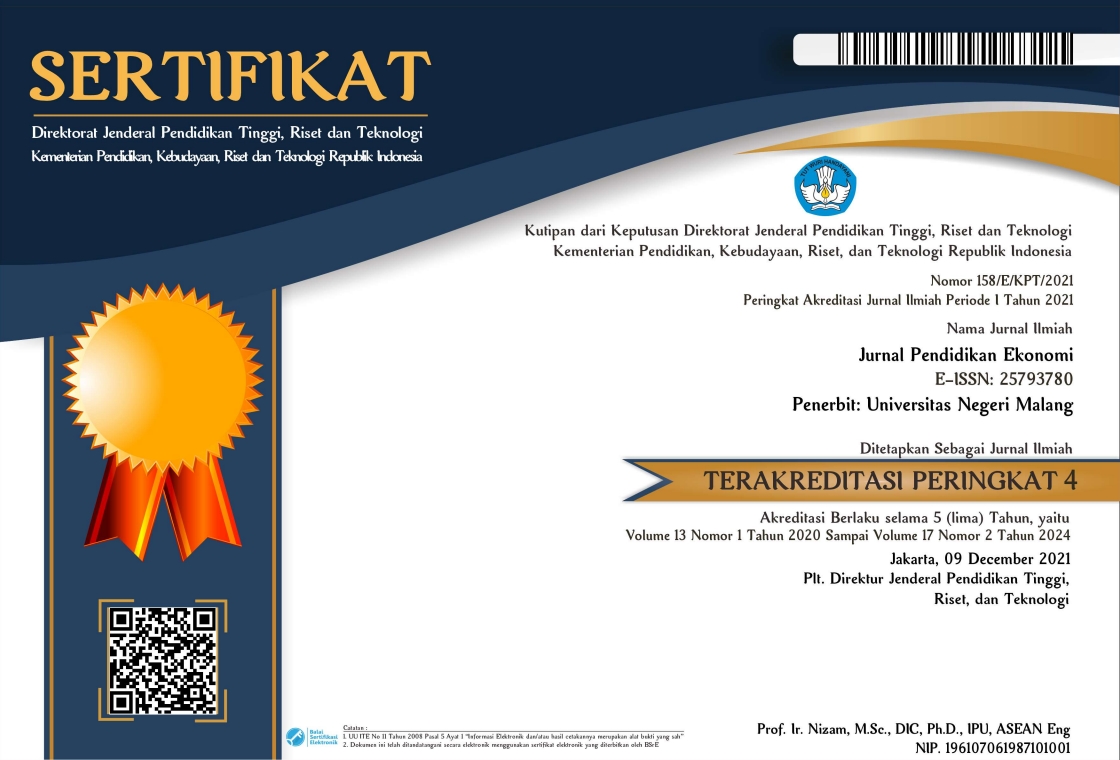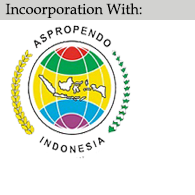Student Entrepreneurship in Indonesia: A Descriptive Analysis based on the Global University Students’ Spirit Survey (GUESSS) Research
Abstract
Keywords: student entrepreneurship, entrepreneurial intentions, university education
Full Text:
PDFReferences
Amani, J. (2013). Social influence and occupational knowledge as determinants of career choice intentions among undergraduate students in Tanzania. International Journal of Learning and Development, 3(3), 185–193. http://dx.doi.org/10.5296/ijld.v3i3.3990
Asimakopoulos, G., Hernández, V., & Miguel, J. P. (2019). Entrepreneurial intention of engineering students: The role of social norms and entrepreneurial self-efficacy. Sustainability, 11(16), 4314. https://doi.org/10.3390/su11164314
Baptista, R., Lima, F., & Preto, M. T. (2012). How former business owners fare in the labor market? Job assignment and earnings. European Economic Review, 56(2), 263–276. https://doi.org/10.1016/j.euroecorev.2011.08.004
Birch, C., Lichy, J., Mulholland, G., & Kachour, M. (2017). An enquiry into potential graduate entrepreneurship: Is higher education turning off the pipeline of graduate entrepreneurs? Journal of Management Development, 36(6), 743–760. https://doi.org/10.1108/JMD-03-2016-0036
Bosma, N., Sanders, M., & Stam, E. (2018). Institutions, entrepreneurship, and economic growth in Europe. Small Business Economics, 51(2), 483–499. https://doi.org/10.1007/s11187-018-0012-x
Brenner, O. C., Pringle, C. D., & Greenhaus, J. H. (1991). Perceived fulfillment of organizational employment versus. Journal of Small Business Management, 29(3), 62.
Campos, H. M. (2017). Impact of entrepreneurial passion on entrepreneurial orientation with the mediating role of entrepreneurial alertness for technology-based firms in Mexico. Journal of Small Business and Enterprise Development, 24(2), 353–374. https://doi.org/10.1108/JSBED-10-2016-0166
Dabić, M., Daim, T. U., Bayraktaroglu, E., Novák, I., & Bašić, M. (2012). Exploring Gender Differences in Attitudes of University Students Towards Entrepreneurship. International Journal of Gender and Entrepreneurship, 4(3), 316–336. https://doi.org/10.1108/17566261211264172
Farrukh, M., Khan, A. A., Khan, M. S., Ramzani, S. R., & Soladoye, B. S. A. (2017). Entrepreneurial intentions: The role of family factors, personality traits and self-efficacy. World Journal of Entrepreneurship Management and Sustainable Development, 13(4), 303–317. https://doi.org/10.1108/WJEMSD-03-2017-0018
Galindo, M., & Méndez, M. T. (2014). Entrepreneurship, economic growth, and innovation: are feedback effects at work? Journal of Business Research, 67(5), 825–829. https://doi.org/10.1016/j.jbusres.2013.11.052
Georgellis, Y., & Yusuf, A. (2016). Is becoming self‐employed a panacea for job satisfaction? Longitudinal evidence from work to self‐employment transitions. Journal of Small Business Management, 54, 53–76. https://doi.org/10.1111/jsbm.12292
Gunawan, T., Jacob, J., & Duysters, G. (2016). Network ties and entrepreneurial orientation: Innovative performance of SMEs in a developing country. International Entrepreneurship and Management Journal, 12, 575–599. https://doi.org/10.1007/s11365-014-0355-y
Hirschi, A., & Fischer, S. (2013). Work values as predictors of entrepreneurial career intentions. Career Development International, 18(3), 216–231. https://doi.org/10.1108/CDI-04-2012-0047
Hoang, G., Le, T. T. T., Tran, A. K. T., & Du, T. (2020). Entrepreneurship education and entrepreneurial intentions of university students in Vietnam: The mediating roles of self-efficacy and learning orientation. Education + Training, 63(1), 115–133. https://doi.org/10.1108/ET-05-2020-0142
Holienka, M., Mrva, M., & Marcin, P. (2013). Role of family entrepreneurial role-models in determining students’ preferences towards entrepreneurship. ICERI2013 Proceedings, 3722–3730.
Hou, F., Su, Y., Lu, M., & Qi, M. (2019). Model of the entrepreneurial intention of university students in the pearl river delta of China. Frontiers in Psychology, 10. https://doi.org/10.3389/fpsyg.2019.00916
Iwu, C. G., Opute, P., Nchu, R. M., Eresia-Eke, C. E., Tengeh, R. K., Jaiyeoba, O., & Aliyu, O. A. (2021). Entrepreneurship education, curriculum and lecturer-competency as antecedents of student entrepreneurial intention. The International Journal of Management Education, 19(1), 100295. https://doi.org/10.1016/j.ijme.2019.03.007
Kwong, C. C. Y., Thompson, P., Cheung, C. W.-M., & Manzoor, H. (2012). The role of environment in fostering conductive entrepreneurial learning: Teaching the ‘art’of entrepreneurship in boot camps. Journal of General Management, 38(1), 45–71. https://doi.org/10.1177/030630701203800103
Lakkol, S. G., Nalina, K. B., & Adarsh, A. (2015). A study on entrepreneurial support environment in educational (technical) institutions. Entrepreneurship in BRICS: Policy and Research to Support Entrepreneurs, 209–223. https://doi.org/10.1007/978-3-319-11412-5_12
Larsson, J. P., & Thulin, P. (2019). Independent by necessity? The life satisfaction of necessity and opportunity entrepreneurs in 70 countries. Small Business Economics, 53(4), 921–934. https://doi.org/10.1007/s11187-018-0110-9
Liu, X., Lin, C., Zhao, G., & Zhao, D. (2019). Research on the effects of entrepreneurial education and entrepreneurial self-efficacy on college students’ entrepreneurial intention. Frontiers in Psychology, 10. https://doi.org/10.3389/fpsyg.2019.00869
Malebana, M. J., & Swanepoel, E. (2019). The relationship between exposure to entrepreneurship education and entrepreneurial self-efficacy. Southern African Business Review, 18(1), 1–26.
Markman, G. D., Baron, R. A., & Balkin, D. B. (2005). Are perseverance and self‐efficacy costless? Assessing entrepreneurs’ regretful thinking. Journal of Organizational Behavior: The International Journal of Industrial, Occupational and Organizational Psychology and Behavior, 26(1), 1–19. https://doi.org/10.1002/job.305
Moussa, N. B., & Kerkeni, S. (2021). The role of family environment in developing the entrepreneurial intention of young Tunisian students. Entrepreneurial Business and Economics Review, 9(1), 31–46. https://doi.org/10.15678/EBER.2021.090102
Mueller, S., Williams-Middleton, K., Neergaard, H., & Tunstall, R. (2015). Alice in wonderland–an experience based approach to learning. 3E Conference, April, 22–24.
Ndou, V., Secundo, G., Schiuma, G., & Passiante, G. (2018). Insights for shaping entrepreneurship education: Evidence from the European entrepreneurship centers. Sustainability, 10(11), 4323. https://doi.org/10.3390/su10114323
Neneh, B. N. (2017). Family support and performance of women-owned enterprises: the mediating effect of family-to-work enrichment. The Journal of Entrepreneurship, 26(2), 196–219. https://doi.org/10.1177/0971355717716762
Neneh, B. N. (2020). Entrepreneurial self-efficacy and a student’s predisposition to choose an entrepreneurial career path: The role of self-perceived employability. Education + Training, 62(5), 559–580. https://doi.org/10.1108/ET-06-2019-0108
Ntari, L. (2023). Parental influence on next-generation family members in South African black-owned family businesses. Journal of Family Business Management, 14(3), 603–620. https://doi.org/10.1108/JFBM-06-2023-0076
Pedrini, M., Langella, V., & Molteni, M. M. (2017). Do entrepreneurial education programs impact the antecedents of entrepreneurial intention? Journal of Enterprising Communities People and Places in the Global Economy, 11(03), 373–392. https://doi.org/10.1108/JEC-12-2016-0043
Pérez-López, M. C., González-López, M. J., & Rodríguez-Ariza, L. (2016). Competencies for entrepreneurship as a career option in a challenging employment environment. Career Development International, 21(3), 214–229. https://doi.org/10.1108/CDI-07-2015-0102
Qoriawan, T., & Apriliyanti, I. D. (2022). Exploring connections within the technology-based entrepreneurial ecosystem (EE) in emerging economies: understanding the entrepreneurship struggle in the Indonesian EE. Journal of Entrepreneurship in Emerging Economies, 15(2), 301–332. https://doi.org/10.1108/JEEE-02-2021-0079
Ramsay, J. E., Pang, J. S., Ho, M. R., & Chan, K.-Y. (2016). Need for power predicts career intent in university students. Journal of Career Assessment, 25(3), 389–404. https://doi.org/10.1177/1069072716639690
Rummel, S., Akkermans, J., Blokker, R., & Van Gelderen, M. (2021). Shocks and entrepreneurship: A study of career shocks among newly graduated entrepreneurs. Career Development International, 26(4), 562–581. https://doi.org/10.1108/CDI-11-2018-0296
Sánchez, J. C. J., & Hernández-Sánchez, B. R. (2013). Gender, personal traits, and entrepreneurial intentions. Business and Management Research, 3(1) 31–40. http://dx.doi.org/10.5430/bmr.v3n1p31
Sawitri, D. R., Creed, P. A., & Zimmer‐Gembeck, M. J. (2015). Longitudinal relations of parental influences and adolescent career aspirations and actions in a collectivist society. Journal of Research on Adolescence, 25(3), 551–563. https://doi.org/10.1111/jora.12145
Schröder, E., Schmitt-Rodermund, E., & Arnaud, N. (2011). Career choice intentions of adolescents with a family business background. Family Business Review, 24(4), 305–321. https://doi.org/10.1177/0894486511416977
Sieger, P., Raemy, L., Zellweger, T., Fueglistaller, U., & Hatak, I. (2021). Global Student Entrepreneurship 2021: Insight From 58 Countries. 2018 GUESSS Global Report.
Sieger, P., Urs Fueglistaller, Zellweger, T., & Braun, I. (2019). Global Student Entrepreneurship 2018: Insight From 54 Countries. 2018 GUESSS Global Report.
Smith, K., & Beasley, M. (2011). Graduate entrepreneurs: intentions, barriers and solutions. Education+ Training, 53(8/9), 722–740. https://doi.org/10.1108/00400911111185044
Solesvik, M., Westhead, P., & Matlay, H. (2014). Cultural factors and entrepreneurial intention. Education + Training, 56(8/9), 680–696. https://doi.org/10.1108/ET-07-2014-0075
Suhartanto, E. (2018). Entrepreneurial Intention, Behaviour and Activities of Indonesian Universities Students - The Indonesia Report of the 2018 GUESSS Project. https://www.guesssurvey.org/resources/nat_2018/GUESSS_Report_2018_Indonesia.pdf
Suhartanto, E. (2021). Entrepreneurial Intention, Behaviour and Activities of Indonesian Universities Students - The Indonesia Report of the 2021 GUESSS Project. https://www.guesssurvey.org/resources/nat_2021/GUESSS_Report_2021_Indonesia.pdf
Suhartanto, E. (2023). Student Entrepreneurship in Indonesia: 2023 GUESSS Report.
Tarling, C., Jones, P., & Murphy, L. (2016). Influence of early exposure to family business experience on developing entrepreneurs. Education + Training, 58(7/8), 733–750. https://doi.org/10.1108/ET-03-2016-0050
Tentama, F. (2018). The relationship between entrepreneurial motivation and entrepreneurial intensity on psychology students. Journal of Educational Science and Technology, 4(1), 26–31.
Tung, L. C. (2011). The impact of entrepreneurship education on entrepreneurial intention of engineering students. City University of Hongkong: Run Run Shaw Library, 11(1), 67–86.
Urbano, D., Aparicio, S., & Audretsch, D. B. (2018). Twenty-five years of research on institutions, entrepreneurship, and economic growth: What has been learned? Small Business Economics, 53(1), 21–49. https://doi.org/10.1007/s11187-018-0038-0
Urbano, D., Audretsch, D., Aparicio, S., & Noguera, M. (2020). Does entrepreneurial activity matter for economic growth in developing countries? The role of the institutional environment. International Entrepreneurship and Management Journal, 16(3), 1065–1099. https://doi.org/10.1007/s11365-019-00621-5
Vamvaka, V., Stoforos, C., Palaskas, T., & Botsaris, C. (2020). Attitude toward entrepreneurship, perceived behavioral control, and entrepreneurial intention: Dimensionality, structural relationships, and gender differences. Journal of Innovation and Entrepreneurship, 9(1), 5. https://doi.org/10.1186/s13731-020-0112-0
Van Gelderen, M., Brand, M., Van Praag, M., Bodewes, W., Poutsma, E., & Van Gils, A. (2008). Explaining entrepreneurial intentions by means of the theory of planned behaviour. Career Development International, 13(6), 538–559. https://doi.org/10.1108/13620430810901688
Walker, E., & Webster, B. (2007). Gender, age and self‐employment: Some things change, some stay the same. Women in Management Review, 22(2), 122–135. https://doi.org/10.1108/09649420710732088
Winkler, C., & Case, J. R. (2014). Chicken or egg: Entrepreneurial self-efficacy and entrepreneurial intentions revisited. Journal of Business and Entrepreneurship, 26(1), 37–62.
Zamfir, A.-M., Mocanu, C., & Grigorescu, A. (2018). Resilient entrepreneurship among European higher education graduates. Sustainability, 10(8), 2594. https://doi.org/10.3390/su10082594
Zellweger, T., Sieger, P., & Halter, F. (2011). Should I stay or should I go? Career choice intentions of students with family business background. Journal of Business Venturing, 26(5), 521–536. https://doi.org/10.1016/j.jbusvent.2010.04.001
DOI: http://dx.doi.org/10.17977/UM014v17i2p148
Refbacks
- There are currently no refbacks.

Jurnal Penddidikan Ekonomi is licensed under a Creative Commons Attribution-NonCommercial-ShareAlike 4.0 International License





